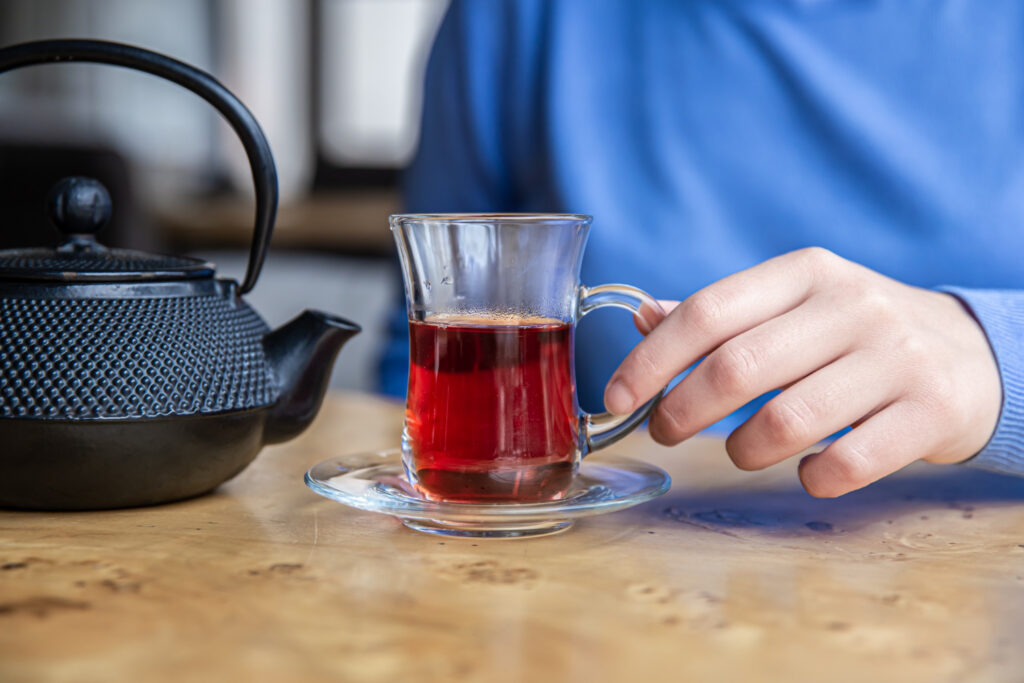
In this article
A warm cup of tea can be the perfect companion on cold days, a social catalyst during chats with friends, or a soothing remedy for stress. Tea’s widespread appeal and numerous health benefits make it the second most consumed beverage in the world, after water, with over 2 billion daily drinkers.
However, drinking tea that is too hot can pose risks, such as an increased likelihood of certain cancers and burns. This article explores the benefits and potential downsides of drinking hot tea.
Types of Hot Tea
The variety of teas available in grocery stores can be overwhelming, ranging from green tea to Earl Grey. Here’s a breakdown of the main types:
True Teas
“True” teas come from the Camellia sinensis shrub, native to China and East Asia. The six main types of true teas differ based on the processing of the leaves:
- White Tea: Made from young leaf buds with silvery or white hairs, quickly dried.
- Green Tea: Green leaves are picked and heated to prevent discoloration.
- Yellow Tea: Leaves are allowed to wither and yellow after picking before being dried.
- Oolong Tea: Leaves are wilted in the sun, bruised, and partially oxidized.
- Black Tea: Leaves are wilted, crushed, and fully oxidized.
- Post-fermented Tea: Green tea that has been fermented and aged, such as pu-erh tea.
Herbal Teas
Herbal teas, or tisanes, are not made from the Camellia sinensis plant. Instead, they include infusions of herbs, spices, fruits, and other plant parts like leaves, flowers, roots, and bark. Common examples include peppermint, chamomile, and ginger teas.
Benefits of Drinking Hot Tea
Rich in Antioxidants
Tea is rich in antioxidants, primarily polyphenols like catechins, which offer numerous health benefits. Studies suggest that drinking green and black teas can:
- Prevent some cancers: Black tea consumption is associated with a 21% reduced risk of cancer death, while green tea can decrease endometrial cancer risk by 11%.
- Reduce heart disease risk: Two cups of tea daily may lower the risk of heart disease, and three cups of green tea can reduce cardiac death risk by 26%.
- Lower blood pressure: Regular tea consumption can marginally reduce blood pressure.
- Prevent type 2 diabetes: Four cups of tea daily may lower the risk of type 2 diabetes by 10%.
- Combat obesity: Tea is linked to lower body fat and may boost metabolism.
- Improve brain health: Tea may reduce depression risk and protect against neurodegenerative diseases like Alzheimer’s.
Protection Against Glaucoma
Studies link hot tea consumption to a lower incidence of glaucoma, a leading cause of irreversible blindness. Drinking at least one cup of hot tea daily has been associated with a 74% lower risk of glaucoma.
Mood Enhancement
Regular tea drinking has been linked to a 30% lower risk of depression. Components like caffeine, L-theanine, and polyphenols may positively influence brain health by reducing inflammation and modulating mood-affecting hormones.
Warmth
Drinking hot tea can reduce shivering in cold conditions by activating temperature receptors in the abdomen, potentially beneficial during cold weather activities.
Downsides of Drinking Hot Tea
Esophageal Cancer Risk
Consuming tea hotter than 140-149°F (60-65°C) can damage esophageal cells, increasing the risk of cancer. To minimize risk, let tea cool below 140°F (60°C) before drinking.
Burns
Tea served at around 191-196°F (91-90°C) can cause severe burns if spilled. Children and older adults are particularly at risk due to thinner skin and smaller body sizes.
Caffeine Content
Tea contains caffeine, which can have negative effects in high doses. Sensitive individuals, pregnant women, and those with certain health conditions should limit their intake to 400 mg per day. Decaffeinated and naturally caffeine-free herbal teas are good alternatives.
How to Prepare Hot Tea
To enjoy hot tea:
- Choose your tea: Select from a variety of true or herbal teas.
- Brew correctly: Follow the recommended temperature and brewing time for each type of tea. For example, black tea should be brewed at near-boiling temperatures for 2-5 minutes, while white tea is best at 158-167°F (70-75°C) for 1-3 minutes.
- Let it cool: Allow the tea to cool below 140°F (60°C) before drinking.
- Avoid add-ins: Adding milk or sugar can lower antioxidant activity. Enjoying tea plain may provide the most health benefits.
Summary
Hot tea offers numerous health benefits, from antioxidants to mood enhancement. However, it’s important to drink it at safe temperatures to avoid burns and cancer risks. Enjoy your tea plain and experiment with different blends to find your favorite
A Quick Review
Hot tea is enjoyed worldwide for its numerous health benefits, such as antioxidants and mood enhancement. However, drinking tea that is too hot can increase the risk of burns and esophageal cancer. This article covers the types of tea, their benefits, potential risks, and best practices for brewing.











